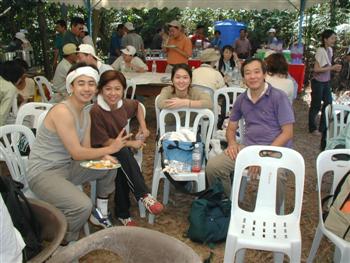Archived content
NOTE: this is an archived page and the content is likely to be out of date.
Overcoming obstacles
As expected, embarking on this green journey is not an easy task. Some of the obstacles Fujitsu faced were - difficulties to quantify and assess the positive environmental impact of Fujitsu’s environmental activities, and replacing of hazardous substances in some of Fujitsu’s parts. Fujitsu overcame the former by developing environmental indicators at an early stage. In fact, they are the first to promote the use of indicators with environmental efficiency factor calculation method to assess environmental improvement effects quantitatively. Fujitsu is also involved in the Eco-efficiency Examination Committee sponsored by Japan’s Ministry of Economy, Trade and Industry (METI) to develop a new approach for a specialised environmental indicator called the Eco-efficiency Factor. The Eco-efficiency Factor will be used to measure the delivery of competitively priced products and services that are able to satisfy consumer needs while progressively reducing ecological impacts and resource consumption throughout the life cycle of the product. With that in place, Fujitsu will be able to evaluate environmental burdens and service performance of existing products, plus measure any relative improvements in any upcoming products. As for replacement of hazardous substances in some of Fujitsu’s products, Fujitsu overcame it by making some significant changes in the production process.
Green Life 21
At Fujitsu, the corporation takes their responsibilities very seriously, both locally and around the world. The organisation aims to put into practice the highest possible environmental standards by implementing programs such as "Green Life 21" with the slogan "Focused on the Green". This initiative observes the 21st century environmental awareness activities, defines environmental objectives and sets extremely high standards for all Fujitsu companies to follow.

Through "Green Life 21", Fujitsu places "Green Earth" as the core and dissect the environmental activities into three areas: "Green Products", "Green Factories", and "Green Solutions". "Green Management" is set as the base of all these activities.
Reforestation projects in Southeast Asia
To extend their environmental efforts beyond factory operations, the Fujitsu Eco Club was established in June 2001. The purpose of this club is to help employees promote and organise voluntary environmental activities. Fujitsu placed very heavy emphasis on enlisting every employee’s voluntary participation to protect the green Earth.
For the past several years, Fujitsu has been conducting reforestation projects in Southeast Asian countries such as Thailand, Vietnam and Malaysia. In 2002, the Fujitsu Group Malaysia Eco-Forest Park in Sabah, East Malaysia was opened. The project is being funded through the contributions and volunteer activities of executives, employees, the workers union and many others from the Fujitsu Group, which totals more than 10,000 people. Once the forestation is completed, administration of the park will be transferred to Sabah Forestry Development Authority. The entire area will be designated as "eco-forest park’ and will be use for environmental studies and eco-tourism. In Vietnam, 200,000 trees were planted and it is estimated to have absorbed CO2 approximately equivalent to the amount generated by 571 households in 2002.
